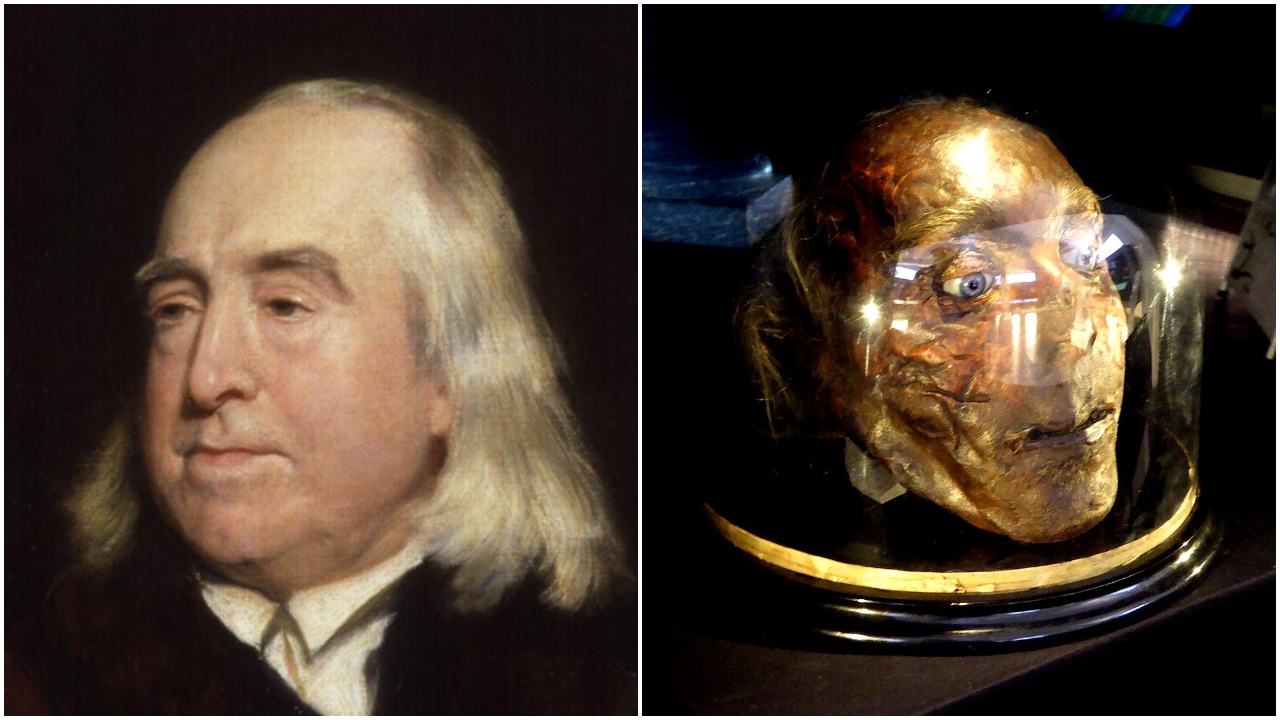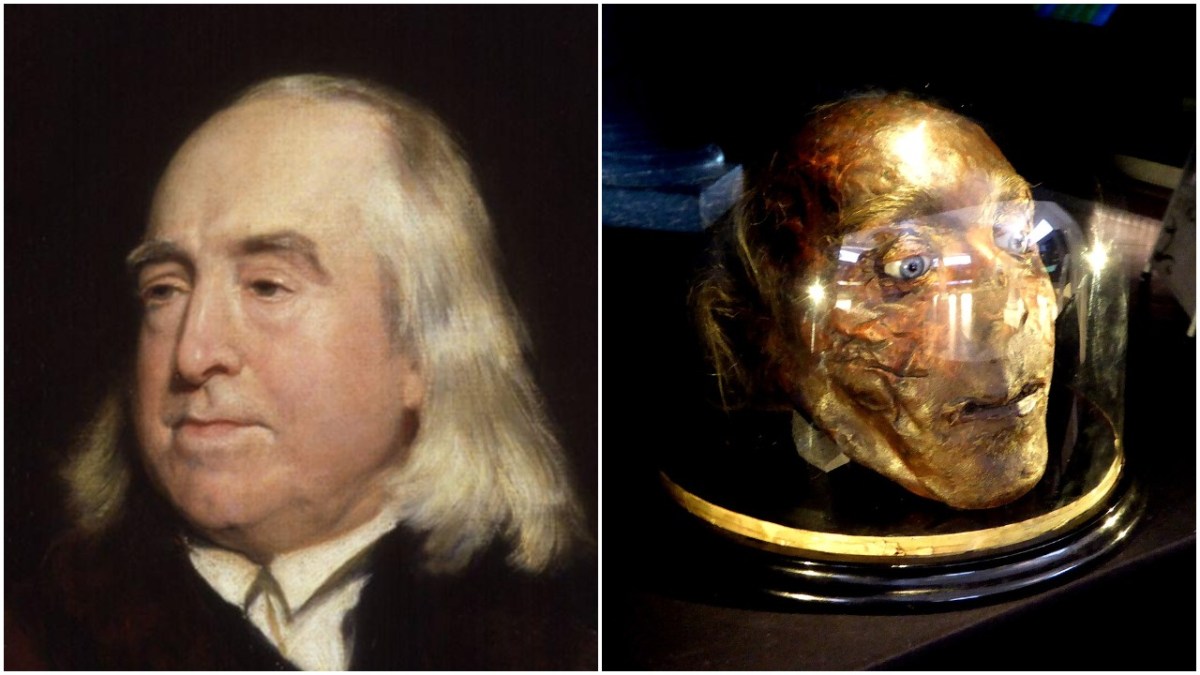Jeremy Bentham and Prisons: A Head of His Time


Lately, there has been a lot of discussion about the prison system, and how the United States’ over-reliance on it props up racial inequality and even the abolition of prisons. This got me thinking about the strange history of the idea of prisons, and the even stranger history of the head of the man who is responsible for much of the philosophy that supports our current prison system.
Jeremy Bentham was born in England in 1748 and is the father of the Utilitarian school of philosophy, which is basically the idea that our actions, in order to be moral, must result in the most pleasure for people (as opposed to suffering). To even further simplify: to be ethical, our actions should do the most good for the most people, or inversely, the least amount of harm. But, as explained here by Professor Todd May, in relation to how Bentham and utilitarianism were used on The Good Place, that gets very tricky very quickly.
Bentham was a prolific philosopher, but one of his biggest contributions to society was the idea of the panopticon. This prototype prison was intended to be less cruel to the inmates, while also being easier to run for the guards. The concept was simple: all the prisoners’ cells were in view of a single, central guard tower in the middle of a circular complex. The prisoners wouldn’t be able to see the guards, so they would always think they were being watched.
The idea was that prisoners would behave better under the belief they were being constantly surveilled and it would be cheaper and easier to manage, and indeed, this would also allow prisons to be not just storage spaces for those deemed unfit for society, but a place where prisoners could work and generate profit. At the time this sounded very out there, but now it sounds a lot like our modern prison-industrial complex, and indeed, the modern surveillance state.
The idea of the panopticon, and generally the idea of placing everyone under surveillance and thus limiting everything they do, was most famously criticized by French philosopher Michel Foucault. He argued that constant surveillance would hinder every aspect of our lives, rather than result in a more ordered society as Bentham argued.
Well, if the everything of the modern age is any indication, they were both wrong. The panopticon was described by Bentham as a “new mode of obtaining power of mind over mind,” but in a modern world where we are constantly observed by cameras, data collection, and even our own devices … we’re still making our own choices and defying the state and other power structures. In America, knowing someone is filming them hasn’t stopped police officers from killing Black people.
(How these ideas apply in places with stricter state surveillance, like China, is a harder thing to get into, especially given that the ideas of individualism and power structures in non-Western cultures are very different, so applying Western philosophy to them isn’t necessarily appropriate.)
But the really, concrete legacy of Betham today is in our prison system. At the time of his conception of the panopticon, Bentham was proposing something that he thought of as good; and indeed it was in the sense that it was better than the models of justice and incarceration of his time. Prisons then were brutal, squalid places that caused suffering. He wanted to change that, and expand prisons as a potential place of reform and profit in contrast to a justice system that still could see people hanged for many crimes.
But reform to the prison system, in the long run, turned out to have its own problems, as we now see in America with our astronomical rates of incarceration and the rise of for-profit prisons. The way that Bentham’s ideas, which seemed great in while he was alive, have gone to strange and not-so-great places after his death is weirdly mirrored by what happened to Jeremy Bentham himself after death, or at least … his head.
Yes. His head. Jeremy Bentham specified that after his death, his body was to be autopsied, then preserved so that his friends could wheel him out at parties if they missed him. This leads me to all sorts of questions, chief of which is: what the hell was wrong with Jeremy Bentham’s friends that he thought they would be into this?
His wishes were honored, however, and his friend Thomas Southwood Smith preserved Bentham’s body and head in what Bentham dubbed an “Auto-Icon.” Or at least, he tried to. The preservation of Bentham’s head went a bit awry and the result was a somewhat mummified noggin that no one would want wheeled out at a party. So Smith did the only logical thing and created a wax version with Bentham’s actual hair and used that.
By MykReeve, CC BY-SA 3.0, Link
The auto-icon, after some time in Smith’s office, took up residence at the University College of London, alongside Bentham’s head. For a while, that is, until students started reportedly stealing the head as a prank. After that the head was removed for safekeeping, but was returned to display in 2017.
And what happened to Bentham and his head is very much like what happened to many of his ideas. What was intended as something to be of comfort to his friends evolved into something incredibly macabre and strange, and proved that even under the watchful wax eyes of the dead man they are disrespecting, people will potentially still do very stupid, criminal things.
This is all to say that it is more than time to reevaluate and overhaul our prison systems the way that Bentham did for those of his own era. What was once progress has become a peril to society that can’t be sustained. Like a creepy, mummified head in a glass case, American prison systems need to be put in a museum as a warning, not wheeled out for party time.
(images: Wikimedia Commons)
Want more stories like this? Become a subscriber and support the site!
—The Mary Sue has a strict comment policy that forbids, but is not limited to, personal insults toward anyone, hate speech, and trolling.—
Have a tip we should know? [email protected]
